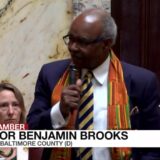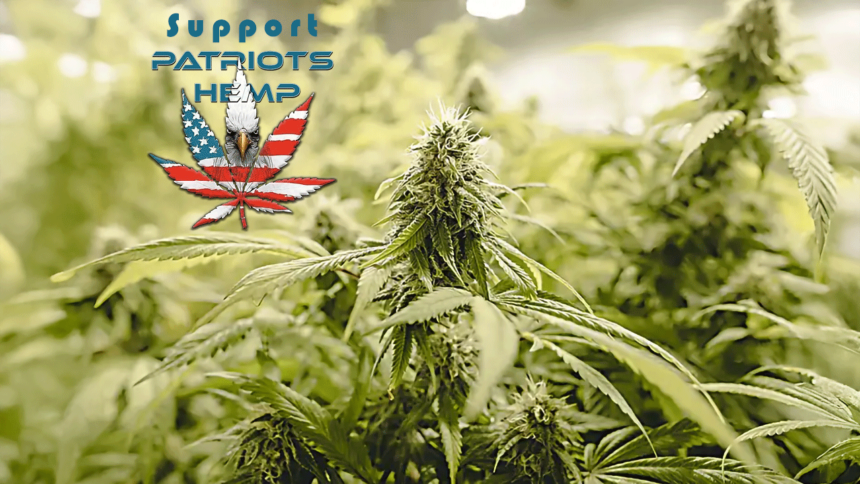Florida Governor Ron DeSantis (R) on Wednesday again lashed out against Amendment 3, a marijuana legalization initiative that’s set to appear on his state’s November ballot, making hyperbolic claims about what the reform would allow—claims backers say are “absolutely untrue.”
Speaking to the Florida Republican delegation at the Republican National Convention in Milwaukee, DeSantis called the proposed constitutional amendment “limitless,” arguing that it would establish a right to marijuana that would be more fundamental than First Amendment or Second Amendment protections for free speech and guns, respectively.
“It gives you limitless constitutional right to possess and smoke,” DeSantis asserted before turning to the proposal’s three-ounce limit on marijuana possession.
“I think it’s up to like, what, 40 joints? Is that the what the three ounces would be, 40—more than that? Eighty joints, something like that,” the governor said. “It will be bad for quality of life, and it will make Florida more blue.”
DeSantis urged the assembled Florida Republicans to oppose the marijuana measure and a separate constitutional amendment that would expand legal access to abortion. “We’ve got to be united as Republicans and do what’s right,” he said at the event, first reported by Florida Politics.
The Florida Republican Party formally came out against Amendment 3 in May.
DeSantis claimed the marijuana legalization measure would establish “a broader constitutional right than your First Amendment rights to speech, free exercise of religion and assembly, broader than the Second Amendment, broader than any other constitutional right.”
He warned the reform would allow open consumption even in privately owned restaurants.
“I think you’re talking about going downtown somewhere, going to restaurants, all this—you are going to see this,” DeSantis said. “And law enforcement’s not going to want to police it at all.”
“I’ve had some restaurant guys [say], ‘Well, I won’t let them use it in my restaurant,’” the governor continued. “Well, I’m not sure you’re going to be able to do that, given how broad it is.”
DeSantis also repeated a complaint he’s often made about other legal states: The smell of marijuana is inescapable.
“You go to places like Denver. It smells like marijuana,” he told the crowd. “It’s not been good for quality of life. So that’s just the reality. We’ve seen in in practice in a lot of places. It hasn’t delivered what they said it would deliver.”
While DeSantis said he understands that not everyone feels the same about marijuana legalization, “I’m not for it,” he opined. “I don’t think it’s good to do. I don’t think we need to mess up the state. We’ve got great tourism, all this stuff.”
He also criticized the corporate backing of the proposed marijuana amendment, noting that the campaign is overwhelmingly funded by a single company, Trulieve, which has donated millions to the legalization effort.
“This is being driven by one company from Canada, and they came into Florida for medical [marijuana],” DeSantis said, apparently referring to Trulieve.
Florida farmers “will not be allowed to” grow marijuana, he said, alleging the proposal’s backers “are basically putting corporate protectionism into the constitution to protect them so they get to sell it all.”
“I mean, how ridiculous is this,” the governor complained, “that we would let our constitution basically be rent-seeking for some Canadian marijuana company. I mean, give me a break.”
A spokesperson for Trulieve called DeSantis’s claims that the company is Canadian “completely and totally untrue.”
“Trulieve was founded in Florida by native Floridians almost 10 years ago and has grown from a startup to an industry leader, creating thousands of jobs in Florida and serving hundreds of thousands of customers in Florida,” Steve Vancore told Marijuana Moment.
Vancore further called it “absolutely untrue” that the proposal would create, in the governor’s word’s, “a limitless constitutional right to possess and smoke.”
“The clear terms and limits are outlined in the actual ballot language including the ability of Florida lawmakers to enact restrictions on when and where someone can smoke,” he said in an email. “Both the actual language of the amendment and the rest of the Florida Constitution clearly and unequivocally give Florida lawmakers to do the same thing they currently do for alcohol and tobacco consumption.”
DeSantis in his remarks urged voters to reject the marijuana- and abortion-related ballot measures, saying they would be detrimental to the state. “When you get back to your counties, you work your local parties, get engaged in those amendments,” he said. “A lot of voters don’t pay close attention to this.”
Earlier this month, news broke that DeSantis’s so-called “Florida Freedom Fund” received a $100,000 donation from the cannabis company group POB Ventures in order to help defeat the marijuana and abortion proposals. That amount was nearly ten times what the campaign had raised in total at the beginning of July.
In an exclusive interview with Marijuana Moment, the CEO of POB Ventures, Patrick O’Brien, said he’s not against adult-use cannabis legalization in principle—but is instead troubled by the specific language of the ballot initiative because it provides an option, rather than a mandate, for regulators to approve additional licenses.
“If you look very closely at the writing, they just messed up—and it was with full intent to mess this up,” O’Brien, who also runs the education platform Sativa University and the cannabis product company Chronic Guru, argued. “All they had to do was make a simple change from ‘may’ issue more licenses to ‘must’ issue more licenses, and we would have had a recreational market.”
By giving regulators that licensing discretion, the measure could effectively kneecap prospective businesses outside of the existing medical cannabis space, he claimed.
But there’s been criticism of the major contribution to the DeSantis PAC, which O’Brien says he will continue to support beyond the initial donation.
Suspicions about the motivations behind the contribution to DeSantis’s PAC aren’t likely to dissolve, especially amid new reporting from CBS News Miami that unnamed hemp businesses have joined forces to back DeSantis in his fight against the legalization measure, with a pledge to contribute $5 million collectively to the state Republican Party after the governor vetoed the bill that ostensibly would have wiped out the market by banning most consumable cannabinoid products.
It’s been previously reported that the governor is hoping to garner support for his efforts to defeat the marijuana legalization initiative from the state’s hemp industry. DeSantis seemed to concede last month that his veto of a bill to ban most consumable hemp-derived cannabinoids was at least partly because he hoped the market would aid in his anti-legalization campaign.
The DeSantis campaign committee, even with the recent contributions, is still miles behind the legalization campaign, Smart & Safe Florida, in terms of fundraising. The legalization effort has raised over $60 million since launching in late 2022.
DeSantis has been railing against the marijuana measure for months—most recently arguing that it would protect the right to use cannabis more strongly than the First Amendment protects free speech or the Second Amendment protects gun rights—and again claiming that the reform has been a “failed experiment” in states such as Colorado.
The governor said last month that the proposal would allow people to “do marijuana wherever you want—just smoke it, take it, and it would turn Florida into San Francisco or Chicago or some of these places.”
He also reprised one of his chief complaints about the potential impact of legalization: smelling cannabis.
“We’ve got to keep our streets clean. We cannot have every town smelling like marijuana. We cannot have every hotel smelling—theme parks,” he said, adding that voters don’t really understand the specifics of the legalization proposal and that ballot initiatives are generally “so bogus.”
DeSantis acknowledged that the state Supreme Court has a role in reviewing ballot language for constitutionality, and that a majority of justices determined that the marijuana measure met the legal standard. But while he previously correctly predicted the court would approve the initiative following a challenge from state Attorney General Ashley Moody (R), he now says the two dissenting justices were “correct” in trying to block voters from deciding on the measure.
DeSantis also claimed last month that that if voters approve the marijuana legalization initiative, people “will be able to bring 20 joints to an elementary school”—and he again complained about the prevalent odor of cannabis that he says would result from the reform.
Legalization has “not worked in any single place,” the governor said, and he challenged a recent ad from the campaign that promoted regulating cannabis as an alternative to the status quo of people using untested cannabis from illicit sellers.
Meanwhile, according to a Fox News poll released last month, two in three Florida voters support the cannabis initiative—with the issue proving more popular than the governor himself. The survey showed majority support for legalization across the political spectrum, too.
The governor has consistently argued that the state shouldn’t go beyond the existing medical cannabis program and that broader reform would negatively impact the quality of life for Floridians. The Florida Republican Party also formally came out against Amendment 3 last month.
Smart & Safe Florida separately announced in March that it was working to form a coalition of veterans to build voter support for the reform, and the campaign has since formally launched that initiative.
Here’s what the Smart & Safe Florida marijuana legalization initiative would accomplish:
- Adults 21 and older could purchase and possess up to three ounces of cannabis for personal use. The cap for marijuana concentrates would be five grams.
- Medical cannabis dispensaries could “acquire, cultivate, process, manufacture, sell, and distribute marijuana products and marijuana accessories to adults for personal use.”
- The legislature would be authorized—but not required—to approve additional entities that are not currently licensed cannabis dispensaries.
- The initiative specifies that nothing in the proposal prevents the legislature from “enacting laws that are consistent with this amendment.”
- The amendment further clarifies that nothing about the proposal “changes federal law,” which seems to be an effort to avoid past legal challenges about misleading ballot language.
- There are no provisions for home cultivation, expungement of prior records or social equity.
- The measure would take effect six months following approval by voters.
Here’s the full text of the ballot title and summary:
“Allows adults 21 years or older to possess, purchase, or use marijuana products and marijuana accessories for non-medical personal consumption by smoking, ingestion, or otherwise; allows Medical Marijuana Treatment Centers, and other state licensed entities, to acquire, cultivate, process, manufacture, sell, and distribute such products and accessories. Applies to Florida law; does not change, or immunize violations of, federal law. Establishes possession limits for personal use. Allows consistent legislation. Defines terms. Provides effective date.”
Economic analysts from the Florida legislature and DeSantis’s office, estimate that the marijuana legalization initiative would generate between $195.6 million and $431.3 million in new sales tax revenue annually if voters enact it. Those figures could increase considerably if lawmakers opted to impose an additional excise tax on cannabis transactions that’s similar to the ones in place in other legalized states.
Unlike the governor, U.S. Rep. Brian Mast (R-FL) said in April that he does believe Florida voters will approve the legalization initiative.
This story has been updated to add comments from a Trulieve spokesperson.
DOJ Doubles Down On Claim That Medical Marijuana Patients ‘Endanger Public Safety’ If They Own Guns





















